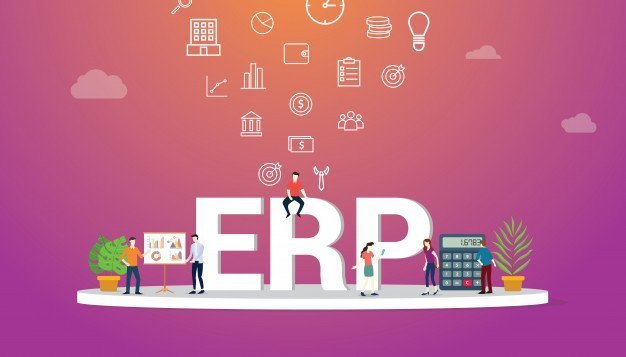8 Signs It’s Time for an ERP System
by Mashum Mollah IT Services Published on: 03 May 2019 Last Updated on: 12 December 2020

ERP system software is a software package that brings together all parts of a business organization for the purpose of managing the flow of that business. All departments of a business are coordinated by ERP software; including sales, purchasing, accounting, staffing, and inventory and management level processes.
Nearly every mid to large-sized business has implemented some form of ERP software long ago, but as the business would evolve, smaller businesses are beginning to see the benefits of ERP solutions as well. You may not know it, but your business might be ripe for ERP adoption. Similarly, you may be using a current ERP system that no longer fits your needs and is in need of an upgrade.
8 Signs It’s Time for an ERP System:
Here are some of the major signs that you might want to consider implementing an ERP solution, or adopting a new ERP system in place of an existing one.
1. Excel isn’t cutting it anymore:
Microsoft Excel tends to be the go-to “Swiss army knife” application for managing a smaller business. And it’s certainly true that this spreadsheet application is versatile enough to do just about anything. The problem with Excel is that while it can fulfill nearly every function, it doesn’t always do it efficiently or well, especially at larger scales.
If you’re increasingly noticing errors, inefficiencies, and cumbersome processes connected with managing your business via Excel, it might be time to upgrade to an ERP system.
2. You need to improve your business’s safety and security:

One important feature of ERP systems is that they can manage access to data more strategically while also improving its accessibility. What this means is that your employees should have access to the information and records they need to do their jobs, and nothing extra. If you’re looking to take this approach to the next level, you should also consider customized solutions, like QMS systems used by the police, for example.
Access to data can be tied to a job role. So, for example, a company’s payroll administrators may have access to employees’ pay data but not to customer records. Likewise, customer service personnel can benefit from having instant access to the complete history of a given customer’s orders, status, or any open orders in real-time (helpful when fielding customer service inquiries), but might not need to have access to customers’ credit card information. Even while an ERP solution uses a centralized database, it can control the access via both role-based and individual identifiers. Using an ERP system means that the security of sensitive data rises significantly.
3. You need to improve productivity:

One of the most valuable resources you possess is your employees’ time. You’re paying them a significant amount of money, and if that time is being spent repeating tasks over and over, your business isn’t running anywhere near peak efficiency.
One of the chief benefits of an ERP system is that it automates a wide range of tasks that previously has been accomplished manually. Imagine, for example, the completion of a sales transaction triggering the manual entry of order information so as to alert shipping, and shipping, in turn, entering data manually so that inventory management can be made aware that stock has been depleted and a reorder by purchasing might be needed. An ERP solution, with its centralized database, automates these transactions. That not only saves employees’ time, it also reduces the opportunity for errors such as duplicate records, incorrect or missing information, or delays in communication. By implementing an ERP system, you can free up your employees, adding value to the business elsewhere.
4. Your business is growing:

The continued growth of your business is a sign that you’re doing things right. But as your business expands, certain practices and standards that might have been working for you are going to start to fall by the wayside. Whether through sheer volume of transactions or due to the increasing complexity of the moving parts of your growing business, what worked yesterday isn’t going to be working so well in the future.
Different ERP systems are specifically tailored for businesses in particular industries and sizes and can bring automated processes to reduce the potential for error and help facilitate communication between the various parts of a sizable business. If your business has grown significantly and you don’t have an ERP system, consider that now might be the time to take that plunge.
5. You cannot access your business’ information easily:
If you want to know something about your business, are you able to access that data within a matter of minutes? Or have you encountered situations where it takes days or more to access some data related to your business or even found yourself unable to gain the knowledge you’re looking for?
If any of that describes the current state of your business, it’s very likely that an ERP system will be of significant aid. ERP systems are able to deliver all relevant data about any function of your business with the click of a button.
6. Your accounting department is struggling:
An accounting department that is a consistent pain point within your business organization is a likely sign you need an ERP system upgrade.
ERP systems are particularly well suited to helping a struggling accounting department dig out of any holes they may find themselves in, delivering clear and accurate financial information in real-time.
7. Your legacy system is too expensive:
Over time, legacy systems tend to become not only less efficient to manage but more expensive to maintain. Accumulated hotfixes and alterations make the system complicated and confusing, and you may be relying on specialized users to make the whole thing run. Even worse, at a certain point, the people who kept the legacy system running may retire or leave the company, leaving a dangerous knowledge gap. At a certain point, it becomes so expensive and risky to continue with a legacy system that you’re better off biting the bullet and upgrading to a new ERP system.
Not only will a new ERP solution, once it’s successfully implemented, likely save money on maintenance, but you’ll also be working with up-to-date technology and all the benefits that go along with that.
8. Your current system isn’t meeting your customers’ needs:
Your customers are your most important resource, and your objective is to satisfy them to win their loyalty and gain positive word-of-mouth advertising. If your current system isn’t helping you keep your customers happy, that’s a major problem for your business.
Shop around and find an ERP solution that provides the support you need to fulfill your customers’ needs. Most often, this means delivering a truly personalized customer experience. You’ll reap the benefit of more loyal and long-lasting customer relationships.
Expensive to maintain legacy systems, opaque business processes, and lack of data, an increase in repetitive tasks taking up your employees’ time – all of these, and the others mentioned above, are significant issues for any business. And all of them can be addressed by selecting the appropriate ERP system.
ERP systems are able to smooth out and power up nearly every facet of a business. If you do your homework in picking out the right software package, take steps to make sure your implementation is a success, you’ll experience significant improvements to the functioning of your business.
Next Steps:
If since reading this you feel your business is ready for an ERP system, Technology Evaluation Centers (technologyevaluation.com) are a well-known, impartial software selection firm. Visitors to their site can browse an abundance of industry research, including white papers, guides, case studies, features lists, reports, and news.
Read Also:







































































































